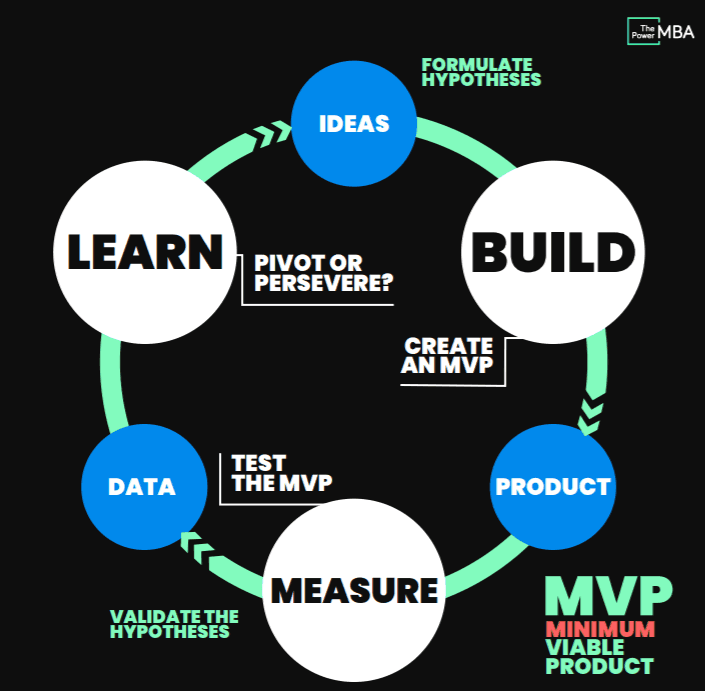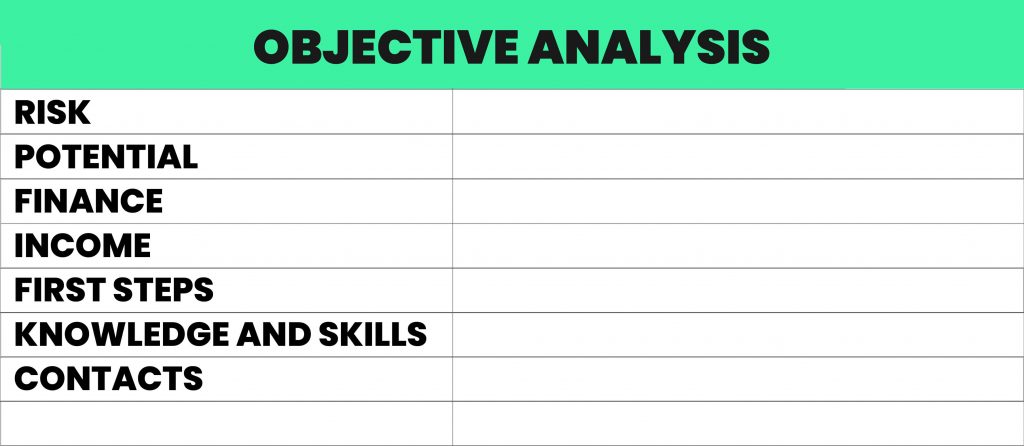What Is One Way For An Entrepreneur to Decrease Risk?

Franco Brutti
Entrepreneurs are often seen as intuitive, driven, and opportunistic characters who fly by the seat of their pants. The courage they display in the face of adversity means they’ll consistently beat the odds, no matter the challenge they face.
Such heroic entrepreneurial tales have led to the perception that those who find success do so because of a willingness to seize opportunities as they present themselves - not because they are better at assessing certain situations.
However, the fact remains…only 1/10 startups succeed.
So while opportunism is certainly a commended trait among entrepreneurs, so is the ability to correctly assess a situation, identify where potential risks lay, and have the foundational knowledge to overcome them and decrease risk.
Unfortunately, entrepreneurs don’t typically have access to the same resources as large enterprises.
If they try something avant-garde and it fails, it’s no big deal. Other areas of the company are often able to absorb the costs and they continue along their merry way.
But when a small business goes all-in on a single idea they are exposed to far greater risk. If it fails, it could literally spell the end of the company.
So the real question is, how do entrepreneurs decrease risk? Is there a systematic approach to maximize a new venture’s long-term success? Are there typical warning signs to watch out for?
How can Entrepreneurs Decrease Risk?
In short, entrepreneurs can decrease their risk exposure through knowledge and preparation.
What do we mean by that?
Well, when those opportunities we mentioned earlier arise, a fully-aware and skilled entrepreneur is going to have a greater understanding of how to fully capitalize on the situation and decrease risk.
Let’s look at a hypothetical scenario where you decide to build an SEO app (for example).
One day you’re commuting to work by train and the idea for your new venture strikes.
How cool would it be if I could complete keyword research, edit articles, and optimize content all from an integrated app?
As an SEO marketer, you’re confident in the features you’ll build into the app but you have no experience building mobile applications.
However, a close friend and ex-colleague of yours also recently launched a successful app and convinces you you'll be fine. As a software developer, he can give you advice on how to structure your team and product roadmap.
So you decide to invest a good portion of your savings into the project and get started right away.
But problems soon begin to arise.
Despite your best efforts to market your product, SEOs just don’t seem interested. They are more than happy with their current setup and don’t see the need to invest in a mobile app, especially when the majority of their work is done on a desktop.
Another barrier you run into is app integration. The few leads you have managed to onboard are only interested in the app if it can be used alongside SEMrush, Ahrefs, and of course, Google Search Console. This would be an expensive addition to a rapidly growing product roadmap.
Without these integrations, marketers will also be unable to run an in-depth SEO audit.
Money also begins to dry up forcing you to seek outside capital investment.
Finally, after securing a meeting with investors, you try to convince them of your venture's potential through the sheer passion and hours you’ve dedicated to the project.
However, the investors remain concerned about the lack of market interest and where your user base will come from.
Eventually, after a year of hard work, graft, and many sleepless nights, you’re forced to shut down the project. The risk, it seems, didn’t pay off this time.
The truth is, the project was doomed from the very start.
Without first speaking to prospective customers to determine whether or not the concept/product was viable, you’re flying blind. You have no idea how the market will react.
It’s a common mistake and a huge unnecessary risk many entrepreneurs take.
When it becomes apparent the market is indifferent to your idea, it’s too late. A vast portion of your personal savings will no doubt have been blown away.
So as you can see, it doesn’t matter which contacts you have or the amount of money behind you - without sufficient preparation and the knowledge to navigate the challenges of early-stage startups, entrepreneurs are going to find it extremely difficult to survive.
But there is one framework that can give entrepreneurs the necessary knowledge and understanding to massively decrease risk exposure - The Lean Startup Method.
The Lean Startup
Founded by American entrepreneur Eric Ries, The Lean Startup provides entrepreneurs with a proven framework for turning ideas into successful products.
It hinges around the concept of testing an idea with a product prototype, gathering feedback from customers, and then making adjustments to the product strategy accordingly.
This is known as the BUILD, MEASURE, LEARN cycle.
Before you can build your prototype, it’s important to formulate a market hypothesis for your idea. Hypotheses are essentially the assumptions made about the impact your product or idea will have on the market.
For example, you are assuming that (X) customers are going to buy your product, that they are going to pay (X) amount for that product, and will be reached through (X) distribution channels.
Phase #1. BUILD
This first phase is all about building your Minimum Viable Product (MVP) and testing it out against your market hypothesis. To do this, you need to run an experiment usually in the form of a product prototype.
Phase #2 MEASURE
Now that the experiment is up and running, it’s time to measure and analyze the incoming data. How does your hypothesis compare to the results? What are the implications of the customer feedback gathered?
Phase #3: LEARN
With the experiment over, it’s time to make a decision. Should you persevere and fully build out your prototype? Or should you pivot, head back to the drawing board and rethink your product strategy

Going back to our example of the SEO mobile app, had we followed The Lean Startup methodology we’d have immediately seen through the testing of our MVP that the product wasn’t viable.
This would have allowed us, as Eric Ries puts it:
To fail fast, and fail cheaply.
To “pivot” after analyzing the initial feedback and review our product strategy. We could look to understand why consumers were not attracted to our MVP? Had we perhaps initially targeted the wrong buyer persona? Or was there just no need for our product?
The framework also allows entrepreneurs to view their ventures objectively.
One of the biggest reasons for startups failing is that the founders can not let a losing project go. A bit like with a partner you just can’t bear to lose - despite the relationship clearly failing - you cling onto the good moments, convincing yourself that somehow, everything will be OK.
Unfortunately, the longer it drags out the more time, money, and eventually, confidence entrepreneurs lose.
Sometimes relationships just can not be repaired, and the best option for both parties is to go their separate ways.
Decrease Risk by Selecting the Perfect Project for You
Another great way to decrease risk is by backing an idea that is perfect for you and/or your co-founding team. Or in other words, choosing a venture where your profiles complement each other over the following four categories

Do you have sufficient knowledge, contacts, skill set, and finance to make this venture a long-term success?
Undertaking an objective analysis of what your venture entails before diving in massively decreases risk exposure and confirms whether or not this project is truly for you.
Try using the following template to get a deeper understanding:

RISK: What’s the risk level? Are you attempting to pursue a Blue Ocean Strategy? Carving out uncontested market space for your innovative idea? If so, then this business strategy has a higher risk/reward element than joining a Red Ocean, for example.
POTENTIAL: How much potential does the project have? Is it a brand new Fintech app with a high ceiling for scalability? Or is it a new take on an existing product in highly competitive market space?
FINANCE: How much money is going to take to lift this project off the ground? Are you able to put those funds together yourself? Do you think it's likely to garner interest from outside capital investors?
INCOME: How quickly are you expecting to be self-sufficient? Are you going to need to raise significant capital to keep the project afloat during its initial stages?
FIRST STEPS: What are the initial steps to get the venture started? Are you going to require outside help? Will you need to hire people from day one?
KNOWLEDGE AND SKILLS - Does your skill set match up the venture’s requirements? Are you entering a familiar market? Do you have experience in marketing, finance, or sales?
CONTACTS - Do you have the necessary contacts to help get the venture started? Would they be able to help you further down the road?
After filling out the template and carefully analyzing each of the implications of launching your startup, you should have a good idea of whether or not to start building your MVP. If you find that between you (and your co-founders) there’s enough knowledge, skill, and finance to make this worth a shot - then full steam ahead!
If not, then perhaps it's time to consider pursuing a different avenue.
To round up
If entrepreneurial history has taught us one thing it's that life presents us with a limited number of true business opportunities - some perhaps passing only once in a lifetime.
Therefore it’s crucial that when they do, we are fully prepared to take advantage of the situation and maximize our chances of success.
If you’re looking to learn how to launch a business from scratch, without making some of the common mistakes mentioned above, then take a look at our alternative MBA for entrepreneurs.
It might be just the thing you’ve been looking for 😉
Looking for something specific?
26 oct 2023
18 sept 2023
8 sept 2023
31 ago 2023
23 mar 2023
15 feb 2023






